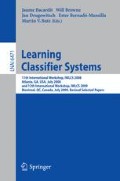Abstract
Despite many successful applications of the XCS classifier system, a rather crucial aspect of XCS’ learning mechanism has hardly ever been modified: exactly two classifiers are reproduced when XCSF’s iterative evolutionary algorithm is applied in a sampled problem niche. In this paper, we investigate the effect of modifying the number of reproduced classifiers. In the investigated problems, increasing the number of reproduced classifiers increases the initial learning speed. In less challenging approximation problems, also the final approximation accuracy is not affected. In harder problems, however, learning may stall, yielding worse final accuracies. In this case, over-reproductions of inaccurate, ill-estimated, over-general classifiers occur. Since the quality of the fitness signal decreases if there is less time for evaluation, a higher reproduction rate can deteriorate the fitness signal, thus—dependent on the difficulty of the approximation problem—preventing further learning improvements. In order to speed-up learning where possible while still assuring learning success, we propose an adaptive offspring set size that may depend on the current reliability of classifier parameter estimates. Initial experiments with a simple offspring set size adaptation show promising results.
Access this chapter
Tax calculation will be finalised at checkout
Purchases are for personal use only
Preview
Unable to display preview. Download preview PDF.
References
Holland, J.H.: Adaptation. In: Progress in Theoretical Biology, vol. 4, pp. 263–293. Academic Press, New York (1976)
Holland, J.H.: Properties of the bucket brigade algorithm. In: Proceedings of the 1st International Conference on Genetic Algorithms, Hillsdale, NJ, USA, pp. 1–7. L. Erlbaum Associates Inc., Mahwah (1985)
Widrow, B., Hoff, M.E.: Adaptive switching circuits. Western Electronic Show and Convention, Convention Record, Part 4, 96–104 (1960)
Wilson, S.W.: Classifier fitness based on accuracy. Evolutionary Computation 3(2), 149–175 (1995)
Lanzi, P.L., Loiacono, D., Wilson, S.W., Goldberg, D.E.: Prediction update algorithms for XCSF: RLS, Kalman filter, and gain adaptation. In: GECCO 2006: Proceedings of the 8th Annual Conference on Genetic and Evolutionary Computation, pp. 1505–1512. ACM, New York (2006)
Drugowitsch, J., Barry, A.: A formal framework and extensions for function approximation in learning classifier systems. Machine Learning 70, 45–88 (2008)
Orriols-Puig, A., Bernadó-Mansilla, E.: Bounding XCS’s parameters for unbalanced datasets. In: GECCO 2006: Proceedings of the 8th Annual Conference on Genetic and Evolutionary Computation, pp. 1561–1568. ACM, New York (2006)
Wilson, S.W.: Get real! XCS with continuous-valued inputs. In: Lanzi, P.L., Stolzmann, W., Wilson, S.W. (eds.) IWLCS 1999. LNCS (LNAI), vol. 1813, pp. 209–219. Springer, Heidelberg (2000)
Wilson, S.W.: Classifiers that approximate functions. Natural Computing 1, 211–234 (2002)
Butz, M.V., Lanzi, P.L., Wilson, S.W.: Function approximation with XCS: Hyperellipsoidal conditions, recursive least squares, and compaction. IEEE Transactions on Evolutionary Computation 12, 355–376 (2008)
Butz, M.V., Wilson, S.W.: An algorithmic description of XCS. In: Lanzi, P.L., Stolzmann, W., Wilson, S.W. (eds.) IWLCS 2000. LNCS (LNAI), vol. 1996, pp. 267–274. Springer, Heidelberg (2001)
Butz, M.V., Kovacs, T., Lanzi, P.L., Wilson, S.W.: Toward a theory of generalization and learning in XCS. IEEE Transactions on Evolutionary Computation 8, 28–46 (2004)
Butz, M.V., Goldberg, D.E., Tharakunnel, K.: Analysis and improvement of fitness exploitation in XCS: Bounding models, tournament selection, and bilateral accuracy. Evolutionary Computation 11, 239–277 (2003)
Butz, M.V., Goldberg, D.E., Lanzi, P.L., Sastry, K.: Problem solution sustenance in XCS: Markov chain analysis of niche support distributions and the impact on computational complexity. Genetic Programming and Evolvable Machines 8, 5–37 (2007)
Butz, M.V., Goldberg, D.E., Lanzi, P.L.: Bounding learning time in XCS. In: Deb, K., et al. (eds.) GECCO 2004. LNCS, vol. 3103, pp. 739–750. Springer, Heidelberg (2004)
Author information
Authors and Affiliations
Editor information
Editors and Affiliations
Rights and permissions
Copyright information
© 2010 Springer-Verlag Berlin Heidelberg
About this paper
Cite this paper
Stalph, P.O., Butz, M.V. (2010). How Fitness Estimates Interact with Reproduction Rates: Towards Variable Offspring Set Sizes in XCSF. In: Bacardit, J., Browne, W., Drugowitsch, J., Bernadó-Mansilla, E., Butz, M.V. (eds) Learning Classifier Systems. IWLCS IWLCS 2009 2008. Lecture Notes in Computer Science(), vol 6471. Springer, Berlin, Heidelberg. https://doi.org/10.1007/978-3-642-17508-4_4
Download citation
DOI: https://doi.org/10.1007/978-3-642-17508-4_4
Publisher Name: Springer, Berlin, Heidelberg
Print ISBN: 978-3-642-17507-7
Online ISBN: 978-3-642-17508-4
eBook Packages: Computer ScienceComputer Science (R0)

